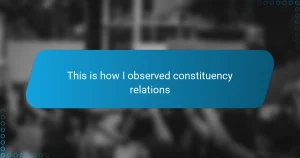Key takeaways
- Senate collaboration thrives on negotiation, trust, and timing, helping to unlock progress on stalled bills.
- Effective collaboration fosters relationships across ideological divides, leading to balanced, thoughtful solutions.
- Challenges include partisan divides, external pressures, and procedural complexities that hinder authentic collaboration.
- Collaboration nurtures innovation through the respectful exchange of diverse perspectives, ultimately benefiting the public.

Understanding Senate Collaboration Fundamentals
Senate collaboration, in my experience, is less about grand gestures and more about the quiet art of give-and-take. I’ve often seen how the smallest concessions can unlock doors that seemed firmly shut, proving that this legislative body thrives on negotiation rather than confrontation. Have you ever wondered why some bills pass with ease while others stall indefinitely? It often boils down to the subtle dance of trust and timing among Senators.
From what I’ve observed, understanding the basics means recognizing that collaboration isn’t simply agreeing on ideas—it’s about forging relationships across ideological divides. When Senators truly listen and respect differing viewpoints, even heated debates can lead to meaningful progress. It’s a humbling reminder that no single person holds all the answers in a chamber designed for diverse voices.
What strikes me most is the patience required in this process. I recall moments when intense public pressure seemed ready to burst the seams of Senate unity, yet through persistent dialogue, unexpected partnerships emerged. This teaches me that collaboration fundamentals rest on resilience and the willingness to find common ground, even when it feels just out of reach.

Key Benefits of Senate Collaboration
One key benefit of Senate collaboration, from what I’ve seen firsthand, is its power to transform gridlock into progress. When Senators commit to working together, even on the toughest issues, it often leads to solutions that are more balanced and thoughtfully crafted. Have you noticed how bipartisan efforts sometimes produce policies that stand the test of time? That’s no coincidence—it’s the benefit of shared input and mutual respect.
Another advantage I find noteworthy is the way collaboration fosters trust among Senators. In my experience, this trust doesn’t just make negotiations smoother; it creates an environment where open dialogue is possible without fear of immediate rejection. I remember witnessing a moment when two unlikely allies joined forces simply because they learned to listen deeply to each other’s concerns. That kind of trust is invaluable in a place often charged with partisan tension.
Finally, collaboration encourages innovation. It might surprise some, but when diverse perspectives collide respectfully, creative ideas emerge that wouldn’t have surfaced otherwise. I often wonder how many potential breakthroughs get lost when cooperation breaks down early. Reflecting on this, it’s clear that Senate collaboration doesn’t just benefit the lawmakers—it ultimately benefits the people they serve.

Challenges Facing Senate Collaboration Today
One challenge I keep noticing is the deepening partisan divide. It feels like Senators are more focused on scoring political points than finding common ground. Have you ever felt frustrated watching debates where even basic agreements seem impossible? I certainly have, and it’s disheartening because that division stalls progress on issues that matter.
Another hurdle is the growing influence of external pressures, like media sensationalism and special interest groups. From my perspective, these forces make it harder for Senators to collaborate authentically. I recall times when behind-the-scenes negotiations were overshadowed by public posturing, which only widened the gap between opposing sides.
Lastly, time constraints and procedural complexities add to the struggle. The Senate calendar is packed, and the rules can feel like a maze designed to slow things down. In moments like these, I wonder how many good ideas never get the chance they deserve simply because the environment isn’t conducive to patient, thoughtful collaboration.


